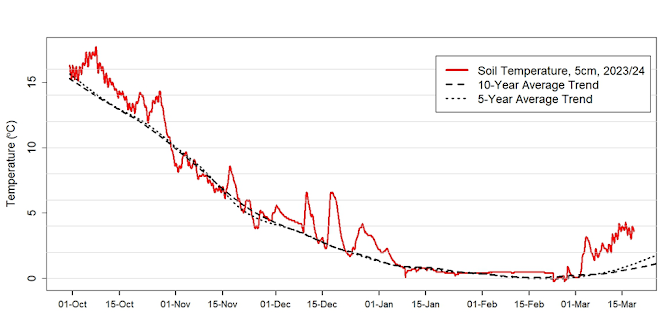BLUE
FOCUS NEWSLETTER- Winter 2024 Edition
(Perennia’s
Wild Blueberry Production Newsletter)
Dear Growers,
Based on how we felt about the last few week’s weather
and some data we collected from weather stations this time of the year, it is
looking like we might have an early spring. According to some national weather
forecasts, Nova Scotia has an 80-90% chance of above-normal spring temperatures
from March to May. We are already seeing some factors that will contribute to
early and fast plant development, such as warmer temperatures and adequate
spring rainfall.
These are just some signs to tell the wild blueberry
community, the 2024 wild blueberry season is here.
This winter edition newsletter will provide some
updates on winter weather and the forecast, resources& management tool
updates, and upcoming industry events.
Hugh Lyu
Wild Blueberry Specialist, Perennia
hlyu@perennia.ca; 902-890-0472.
March 27, 2024
Table of Contents:
Nova Scotia Winter Updates and April Forecast
Wild Blueberry Resources and Management Tools
Upcoming Events
Nova Scotia Winter Updates and April Forecast
Air
temperature trend in NS from Oct 1 to March 15:
This past fall, NS and other parts of Canada experienced
some record-breaking fall temperatures in 2023. In Figure 1, those periods were
the first two weeks of October and the beginning of December.
This past winter also mixed a few warm periods (+10 °C) in
Nova Scotia. We also had some cold days when snow coverage was sufficient
across the region.
An interesting thing to note is that after March, we had
above-average warmer days every single day (Figure 1). This is a sign that we
are going to see earlier plant emergencies and fast development if we continue
to experience warmer temperatures this spring. According to the national
forecast, we have an 80-90% chance to see above-normal temperatures in Nova
Scotia this spring.
Soil
temperature trend in NS from Oct to March 15:
Soil temperature changes as air temperature fluctuates. In
Figure 2, some above-average soil temperature periods were also in the first
two weeks of October and the beginning of December. Soils in Nova Scotia should
be below 0 °C this past winter.
Similar to air temperatures in March, soil temperatures were
also above average in the first two weeks of March. From the Wild Blueberry
weather station data, we observed that soil temperatures in wild blueberry fields
range from 1-5 °C. Again, this is another sign of fast and early plant
development.
Figure 1. Air temperatures in Kentville Research Weather Station, Oct 1, 2023, to March 15, 2024
Figure 2. Soil
temperatures (5 cm) in Kentville Research Weather Station, Oct 1, 2023
to March 15, 2024
Figure 3. Forecast
probability of temperature above, below, and near normal.
Wild Blueberry Resources and Management Tools
Here are some Perennia wild blueberry extension resources
and management tools for growers.
1.
Perennia Wild Blueberry Blog: http://www.novascotiawildblueberryblog.com/.
Please subscribe
to and continue to follow the blog for wild blueberry management. Some
important information covered under the blog includes:
a.
Wild Blueberry Weather Station Network
(including soil temperatures)
b.
GDD updates- 17 weather stations in the 2024
season (Figure 4)
c.
Monilini Blight monitoring
d.
Production newsletter
e.
Wild blueberry and Industry event calendar: http://www.novascotiawildblueberryblog.com/p/events.html.
Figure
4. 17 weather stations for GDD updates in the 2024 season
2.
Perennia
Farm Data Tool: https://farmdatatools.ca/.
Under
the Farm Weather Map, you would be able to select your weather station and get
the weather data. It also offers a feature to calculate GDDs.
3.
NS
Wild Blueberry Crop Development Schedule and Management Recommendations 2024: https://www.perennia.ca/wp-content/uploads/2018/03/Nova-Scotia-Wild-Blueberry-Crop-Development-Schedule-and-Management-Recommendations-2024.pdf.
This
guide (updated in March 2024) highlights the most updated GDDs for important
wild blueberry growth stages. I strongly recommend growers use this GDD tool to
know your field's crop stage for better and timely management. Here are some
numbers for growers to use as thresholds to plan field activities:
a.
Sprout
field: plant emergence starts at 213 GDD. We recommend growers start applying pre-emergence
herbicides (Chikara, Ignite, Spartan, Involve 50 WDG, Velpar etc) between 150-
200 GDD.
b.
Crop
field- 40% F2: 166
GDD. After this point, growers should monitor weather and field
conditions closely for Monilinia Blight management.
c.
Crop
field- bloom stages and GDDs. 25% bloom- 400 GDD; 70% bloom- 470 GDD; 90% bloom- 526 GDD.
d.
Crop
field- ripening fruits. First
ripening fruit- 1142 GDD; 90% ripening- 1693 GDD (harvest point).
4.
Perennia’s
NEW Online Searchable pest management guides. On April 10, Perennia will
release its’ new online pest guides where growers can search based on different
criteria. We will share the platform’s link with growers as soon as possible.
Upcoming Events
*Please visit
Perennia Wild Blueberry Blog Calendar where important wild blueberry-related
opportunities will be shown: http://www.novascotiawildblueberryblog.com/p/events.html.
1. In-Season
Wild Blueberry Growers’ Meeting Series: bi-weekly, 1
hour wild blueberry management information meeting from March to July. To
register, please visit this link: https://www.perennia.ca/eventer/in-season-wild-blueberry-meeting-series-2024-production-season/edate/2024-03-27/
2. Perennia:
Introducing Perennia’s Online Pest Management Guides:
April 10, 2024 at Noon. Perennia has created an online pest guide to streamline
your pesticide selection process and help you access information more easily.
Join us on April 10th as we show you how to maximize its usefulness to your
farm. To register, please visit this link: https://www.perennia.ca/eventer/introducing-perennias-online-pest-management-guides/edate/2024-04-10/.
3. Upcoming
WBPANS wild blueberry twilight meetings: please watch WBPANS’ newsletter
for the most up-to-date meeting information.





